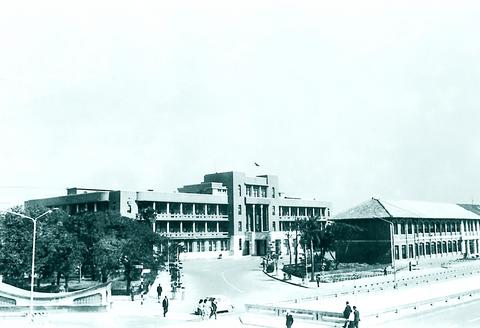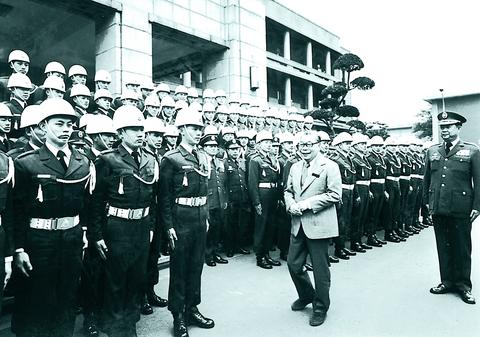The Executive Yuan, guarded by the military since 1957, turned a page on Jan. 1 when officers of the National Police Administration took over the job of protecting the facility and the complex was opened to the public for weekly visits.
On the first day it was open, about 4,000 people swarmed the complex to see the interior of the 63-year-old building.
The Executive Yuan was opened to the public in line with the Cultural Heritage Preservation Law (文化資產保護法), which stipulates that historic sites should be open to the pubic. The main three-story building was declared a national historic relic in 1998.

PHOTO: COURTESY OF THE EXECUTIVE YUAN
The building sits next to offices belonging to the Government Information Office (GIO) on the east, west and north sides.
Since the building became home to the offices of the Executive Yuan in 1957, 12 premiers have served their terms in there. They are: Chen Cheng (陳誠), Yen Chia-kan (嚴家淦), Chiang Ching-kuo (蔣經國), Sun Yun-suan (孫運璿), Yu Kuo-hwa (俞國華), Lee Huan (李煥), Hao Po-tsun (郝柏村), Lien Chan (連戰), Vincent Siew (蕭萬長), Tang Fei (唐飛), Chang Chun-hsiung (張俊雄) and Yu Shyi-kun.
Between 1945 and 1957, the building was the home to the Taiwan Provincial Government. During that time, six provincial governors served there. They are: Chen Yi (

PHOTO: COURTESY OF THE EXECUTIVE YUAN
In 1941, one year after the main building was completed, the Taipei City Government relocated to the premises. Two Japanese mayors served their terms there between 1941 and 1945.
Before 1940, the Taipei City Government was situated at a building belonging to the Huashan Primary School, which sat in front of the main building. The building was torn down in 1985 because of serious leakage and deterioration.
Architecture
Construction of the main building started in 1937 and did not finish until 1940.
Although the facade of the building is neither grand nor embellished, it displays simplicity and symmetry.
According to Jung Ho-hsiung (
"The building possesses 10 unique features," Jung said.
First, the architecture reflects the trend in the 1930s of functionalism, which was espoused by the Bauhaus School in Germany, he said.
The signature style of the Bauhaus modernist design integrates expressionist art with architecture and had an influence throughout the world.
While the exterior of the building has a combination of simple squares and horizontal lines, the interior is clearly divided in a hierarchy based on function.
A pair of square shaped columns at the entrance of the building was obviously influenced by the American architect Frank Lloyd Wright, Jung said.
Dubbed the pioneer of creating greatness through simplicity, Wright helped create the form of modern architecture. His principle of "organic architecture" sought to integrate structures with their natural environments.
While the lower half of all exterior walls is made of stone, the remainder is covered with light brown ceramic tiles.
"Light brown is considered the `national defense' color because it provides camouflage against air raids," Jung said.
Balconies were constructed on the east, south and west sides of the building. They help shield the structure from the sun and rain. They also serve as natural ventilators.
The interior walls are covered with polished terrazzo in various colors.
Unlike other conventional buildings, the stairway is situated in the middle. The staircase was built using steel-reinforced concrete, an excellent material for withstanding earthquakes.
In addition, the spacious grand conference room on the third floor of the east side has an imposing 9m high ceiling and stretches 24m from wall to wall.
Another feature of the building is the sash windows, Jung said.
"Although the window frames were made out of wood and have been used for many years, they're still in excellent condition," he said, pushing up one of the windows outside his office overlooking a small garden in the courtyard.
The courtyard was originally used as a parking space where water faucets were constructed for the convenience of visitors who could freshen up before entering the building.
The visitors
Although the Cabinet saw some 4,000 people visit the building on its opening day, the number has since dwindled to between 200 and 300 each day.
Jung said he is not worried about the smaller number.
"We are, after all, not a tourist attraction where the number of visitors and ticket sales matter," he said. "We don't do much advertising, but we try our best to offer the best service possible to our visitors."
According to Jung, there are 120 trained part-time volunteers to guide tours of the building.
To be a qualified guide, volunteers must complete a 32-hour training course and undergo a three-month trial before they are allowed to work. The Cabinet offers a small transportation and food allowance for the volunteers.
"They come from all walks of life, including retired teachers, civil servants and business leaders," Jung said.
Although records have shown no foreign visitors so far, Jun said, English and Japanese literature has been made available and guided tours in various languages can be arranged.
"We have volunteer guides speaking all kinds of languages ranging from Mandarin, Taiwanese, English to Japanese," he said.
In order to tour the building, visitors must make reservations at least one week in advance. The maximum number of visitors allowed per day is 1,000. Visitors must also pass through a metal detector at the entrance.
Unlike the Presidential Office, which is open to the public five days a week, the Executive Yuan is open only on Fridays between 9am and 4pm plus New Year's Day and Double 10 Day.
The opening hours could be extended if need be, Jung said.
"Since the first three months is a trial period, we'll carefully review the program and make adjustments accordingly," he said.
Despite renovation projects in 1975, 1981 and 1991, Jung said, the main building is undergoing another face-lift.
"We hope the NT$20 million, three-year project will be finished by next year," he said.
The project focuses on the removal of paint on the exterior walls and replacing some of the tiles.
The premiers
No one in the Executive Yuan knows about the past seven premiers and the incumbent better than Ho Chia-kuo (
Ho, a former journalist and international-relations professor, joined the Cabinet in 1984 as the office manager of the Cabinet secretary-general when Yu Kuo-hwa was premier.
Describing Yu Kuo-hwa as sincere and tacit, Ho said Yu was someone who liked to take care of every detail personally.
Lee was a workaholic and Hao was a very impatient man.
"I remember one time I didn't finish proofreading a report for the premier [Hao], who would deliver the report at the legislature at 5 o'clock in the morning. While I was in bed taking a nap, I got a phone call from him at 7am telling me to bring him five copies of that report at eight," Ho said.
Lien, on the other hand, was a nice and honest person, Ho said.
"Some media portray him as being full of pride, but,on the contrary, he's very friendly and easy to talk to," Ho said.
Lien's successor Siew, Ho said, was a typical bureaucrat who was conservative and cared too much about what people thought of him.
A consultant who has been working at the GIO for 27 years expressed a different opinion.
"I thought he [Siew] was an ambitious person who was scrupulous in separating public from private interests," said the consultant, who asked not to be named.
She said Tang, who was a soldier before becoming premier, was surprisingly gentle and mild-tempered.
As for the incumbent premier, Yu Shyi-kun, she shook her head and went on the offensive.
"He totally disappoints me," she said. "I thought he would have managed the country as well as he did when he was the Ilan County commissioner, but unfortunately it's not the case. He's the worst premier I've ever seen and some of the rules he set down just don't make any sense."
She cited the examples of Yu setting the ceiling of a banquet for civil servants at NT$6,000 per table and banning civil servants from sending flowers as gifts.
"Obviously, he doesn't think before he talks," she said.

Taiwan has received more than US$70 million in royalties as of the end of last year from developing the F-16V jet as countries worldwide purchase or upgrade to this popular model, government and military officials said on Saturday. Taiwan funded the development of the F-16V jet and ended up the sole investor as other countries withdrew from the program. Now the F-16V is increasingly popular and countries must pay Taiwan a percentage in royalties when they purchase new F-16V aircraft or upgrade older F-16 models. The next five years are expected to be the peak for these royalties, with Taiwan potentially earning

STAY IN YOUR LANE: As the US and Israel attack Iran, the ministry has warned China not to overstep by including Taiwanese citizens in its evacuation orders The Ministry of Foreign Affairs (MOFA) yesterday rebuked a statement by China’s embassy in Israel that it would evacuate Taiwanese holders of Chinese travel documents from Israel amid the latter’s escalating conflict with Iran. Tensions have risen across the Middle East in the wake of US and Israeli airstrikes on Iran beginning Saturday. China subsequently issued an evacuation notice for its citizens. In a news release, the Chinese embassy in Israel said holders of “Taiwan compatriot permits (台胞證)” issued to Taiwanese nationals by Chinese authorities for travel to China — could register for evacuation to Egypt. In Taipei, the ministry yesterday said Taiwan

Taiwan is awaiting official notification from the US regarding the status of the Agreement on Reciprocal Trade (ART) after the US Supreme Court ruled US President Donald Trump's global tariffs unconstitutional. Speaking to reporters before a legislative hearing today, Premier Cho Jung-tai (卓榮泰) said that Taiwan's negotiation team remains focused on ensuring that the bilateral trade deal remains intact despite the legal challenge to Trump's tariff policy. "The US has pledged to notify its trade partners once the subsequent administrative and legal processes are finalized, and that certainly includes Taiwan," Cho said when asked about opposition parties’ doubts that the ART was

If China chose to invade Taiwan tomorrow, it would only have to sever three undersea fiber-optic cable clusters to cause a data blackout, Jason Hsu (許毓仁), a senior fellow at the Hudson Institute and former Chinese Nationalist Party (KMT) legislator, told a US security panel yesterday. In a Taiwan contingency, cable disruption would be one of the earliest preinvasion actions and the signal that escalation had begun, he said, adding that Taiwan’s current cable repair capabilities are insufficient. The US-China Economic and Security Review Commission (USCC) yesterday held a hearing on US-China Competition Under the Sea, with Hsu speaking on